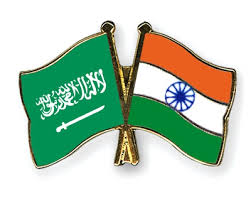New Delhi: Sep 17: Saudi Arabia has withdrawn its diplomat, who has been accused of raping two women from Nepal at his residence in Gurgaon near New Delhi.
 The Ministry of External Affairs in New Delhi late on Wednesday confirmed that the diplomat had left India. “We learn that Saudi embassy First Secretary, Mr Majed Hassan Ashoor, who is allegedly accused of abusing two Nepali maids, has left India,” Vikas Swarup, official spokesperson of the MEA, said in a statement.
The Ministry of External Affairs in New Delhi late on Wednesday confirmed that the diplomat had left India. “We learn that Saudi embassy First Secretary, Mr Majed Hassan Ashoor, who is allegedly accused of abusing two Nepali maids, has left India,” Vikas Swarup, official spokesperson of the MEA, said in a statement.
Though the MEA did not clarify the circumstances leading to the diplomat’s departure from India, it is understood that Riyadh opted to withdraw him after New Delhi nudged it to do so.
“The First Secretary being a diplomat is governed by the provisions of the Vienna Convention on Diplomatic Relations,” Swarup added in his statement on Wednesday.
Ashoor enjoyed immunity from any criminal investigation or arrest in India in accordance with Article 31 of the Vienna Convention on Diplomatic Relations 1961.
New Delhi had clearly conveyed to Riyadh that it should either waive the immunity of Ashoor to allow Haryana Police to question him in connection with the case, or he should be withdrawn.
With Saudi Arabia not ready to waive the immunity of the diplomat, his withdrawal was the only way out for New Delhi and Riyadh to make it sure that the incident does not strain bilateral ties, particularly ahead of Prime Minister Narendra Modi’s proposed visit to the kingdom later this year.
Deccan Herald had reported on September 10 that Saudi Arabia might withdraw the diplomat.
The women, who hailed from Morang and Banglung district of Nepal, were rescued by police during a raid in the fifth floor flat the Ambience Island Caitriona apartment in Gurgaon early last week.
The women lodged a First Information Report (FIR) at DLF Phase II police station in Gurgaon, alleging that they were kept confined and raped frequently. They later told media-persons that not only the residents of the flat raped and tortured them and forced them into “unnatural sex”, but guests of the family had also sexually assaulted them on several occasions.
The women did not name the alleged perpetrators in their statements to police and the judicial magistrate. The cops, however, found that the flat was being used by Ashoor as residence.
The diplomat and his family enjoyed immunity from any criminal investigation or arrest in India in accordance with Article 31 and Article 37 of the Vienna Convention on Diplomatic Relations 1961. Saudi Arabia, however, could have waived the immunity under Article 32 of the convention.
Saudi Arabia’s Ambassador Saud Bin Mohammed A Al Sati met Thanglura Darlong, Joint Secretary in the Gulf Division of the MEA, and lodged a protest over police raid into the residence of the diplomat, alleging that it was in violation of diplomatic norms.
Police, however, claimed that they were not aware of the identity of the residents of the flat, when they had conducted the raid following a complaint by a non-profit organisation.
Saudi Arabia’s ambassador to India, was also called in to the MEA headquarters at the Jawaharlal Nehru Bhavan on September 10 and had a meeting with Joint Secretary (Protocol) Jaideep Majumdar.
Majumdar conveyed to Al Sati the request of Haryana Police for cooperation in the investigation, by waiving the diplomatic immunity of Ashoor and making him available for questioning.
With Riyadh not ready to accept the request, his withdrawal from New Delhi was the only way out.





Comments
Add new comment